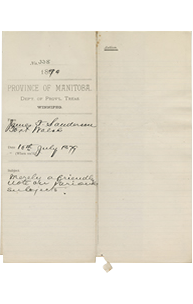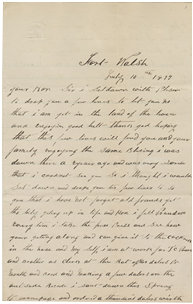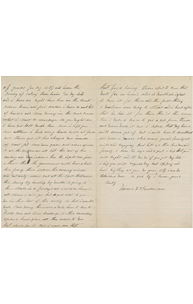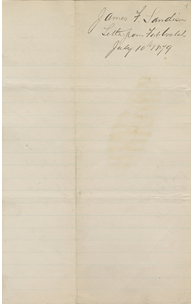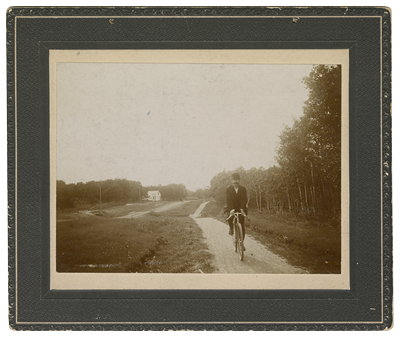Visit this blog for regular posts about Your Archives: The Histories We Share. Visit the Archives of Manitoba to see the records in person.
February 2020:
- February 27, 2020: A letter written by James Sanderson to John Norquay in 1879 - Submission from Gerald Friesen, University of Manitoba
- February 25, 2020: Cyclist on trail along Portage Avenue, 1900 - Submission from Glenn Bergen, Managing Editor, University of Manitoba Press
- February 21, 2020: Photo from 1964 of the Simpsons-Sears building at Polo Park Shopping Centre - Submission from Belle Cameron, Admin of Facebook group ‘Retro St. James’
- February 18, 2020: 1967 Pan Am Games documentary – Submission from Ross Munro, filmmaker, born in Winnipeg now living in Vancouver, B.C.
- February 14, 2020: HBC's 1919 film expedition: textual materials and nitrate film footage - Submission from Kevin Nikkel, filmmaker
- February 7, 2020: Welcome and submission from Minister of Sport, Culture and Heritage Minister and the Minister Responsible for the Status of Women, Honourable Cathy Cox

February 27, 2020
A letter written by James Sanderson to John Norquay in 1879 - Submission from Gerald Friesen, University of Manitoba
“The papers of John Norquay are a wonderful treasure. They moved from legislature to family and then to an historian, Ellen Cooke, who gave them to the archives in 1986. They were organized and indexed by Lee Gibson. One unusual aspect: among the five to seven thousand documents are a few that reveal a little about Bungee, the distinctive dialect of English spoken by Red River, Hudson's Bay Company, and northern prairie First Nations in the nineteenth century. This is conveyed in spelling that is closer to phonetic than Queen's Standard English. Consider the following example, a letter written by James Sanderson, who was born at Athabasca Landing in 1848 and moved with his parents to a river lot near Norquay's farm at High Bluff. He worked as freighter and scout between Montana and the Cypress Hills in the late 1870s and early 1880s. His letters to Norquay from the Cypress Hills speak of life on the prairies in the late 1870s and early 1880s. This one, written in the summer of 1879, warned of the disappearance of buffalo and shortages of food.”
“The papers of John Norquay are a wonderful treasure. They moved from legislature to family and then to an historian, Ellen Cooke, who gave them to the archives in 1986. They were organized and indexed by Lee Gibson. One unusual aspect: among the five to seven thousand documents are a few that reveal a little about Bungee, the distinctive dialect of English spoken by Red River, Hudson's Bay Company, and northern prairie First Nations in the nineteenth century. This is conveyed in spelling that is closer to phonetic than Queen's Standard English. Consider the following example, a letter written by James Sanderson, who was born at Athabasca Landing in 1848 and moved with his parents to a river lot near Norquay's farm at High Bluff. He worked as freighter and scout between Montana and the Cypress Hills in the late 1870s and early 1880s. His letters to Norquay from the Cypress Hills speak of life on the prairies in the late 1870s and early 1880s. This one, written in the summer of 1879, warned of the disappearance of buffalo and shortages of food.”
The following is a transcription of the letter, prepared by Gerald Friesen:
“Your Hon Sir i sit down with Plume to drop you a few lines to let you no that i am yet in the land of the livin and enjoyin good helt thanks god[.] hoping that this few lines will find you and your family enjoying the same blessing[.] i was down there a year ago and was very sorry that i cood not see you[.] So i thought i would sit down and drope you tis few lines to so [show] you that i have not forget old frands yet tho hily [highly] getting up in life and Hon i feel Proudness every tim i take the Free Press and see how your getting along and can give it to the cockies in the nose[.] and my self i am at work for T C Power and brother as clerk at the Rat of $60 dolars per month and Bord and making a few dolars on the outside[.] Becide i send down this spring to Winipage and ordered a thousand dalers wirth of goods for my self and have the [illegible word] of saling them for myself and i have an eight hors teem on the Rowt [route] bitwen hear and Fort Benton[.] i have 30 hed of horses and some money in the Bank Beside what i sent to Winipage[.] so you might see i have not lost much time since i left you last althow i had very hard luck at first but thank god it has changed now[.] i would of sent for som more goods but i was afraid to as the Buffalo are all left this part of this country and more Indians than the Pepell can feed
i think that the government will have a hard time feeding there indins this coming winter and not only indins but all the Pepell that makes their living by hunting My master is going to the Steats in a few days and i will be hear all somer i wis[h] you had a good Bilet [contract] to give me in this part of this contry so that i would mak som money[.] there was a male [mail] hear to run to Batell River and Peaars brother got it[.] this commanding ofisers their gives all their work to men that suck for it but I cant do that for a living[.] Pears oferd [offered] to run that Male for 400 hundred dalers pr month and I oferd to run it for three and the first thing I new Pears was redy to start – and i hard [heard] after that he took it for three[.] this is the second tim i made a Brack to get a sale from them and never made it[.] But I sipose that my time will come yet if not i will have to do without and now I must close wising [wishing] you and family all well and enjoying good helt as this has me and family i have two boys and a girl[.] i hop that you will right [write] and let me no if you get my leter i hop you will exques [excuse] by bad speling and hand righting as you no your self i am no aducted [educated] man so good by I remain yours truly. James F. Sanderson”
Want to know more? Search Keystone for other records related to Bungee, buffalo, and John Norquay. You can also Visit Us in person at the Archives of Manitoba.
Want to participate in Your Archives? See Submit Your Story for details. You may e-mail us at [email protected] with a comment about this blog post and your comments may be included on this page.
February 25, 2020
Cyclist on trail along Portage Avenue, 1900 - Submission from Glenn Bergen, Managing Editor, University of Manitoba Press
“The Winnipeg Streets folders in the research room photo collection have long been my favourite records to browse at the Manitoba Archives. Among other photos sorted under organizations, people, and photographers, this drawer offers a delightfully random set of images, with some great surprises, including what is probably one of the earliest photos of a Winnipeg cyclist.”
“This particular image gives a sense of a landscape and forest that was found in early Winnipeg, and hints at how prominent bicycles were before cars took over the roads. Cycling infrastructure isn't a new idea, as shown in the bike path that parallels Portage Avenue in this photo. We have a long way to go before we can reclaim the kind of ‘active transportation’ system we had over a century ago.”
Want to know more? Search Keystone for other records related to Portage Avenue, bicycles, and active transportation. You can also Visit Us in person at the Archives of Manitoba.
Want to participate in Your Archives? See Submit Your Story for details. You may e-mail us at [email protected] with a comment about this blog post and your comments may be included on this page.
February 21, 2020
Photo from 1964 of the Simpsons-Sears building at Polo Park Shopping Centre - Submission from Belle Cameron, Admin of Facebook group ‘Retro St. James’
“I choose this photo because it shows the classic cars of that era. I run a Facebook group called ‘Retro St. James,’ and we post a lot of photos from the Manitoba Archives. I notice which photos are popular among our 7,000 members and it seems people love to see old photos from their youth, anything with storefronts or classic cars.”
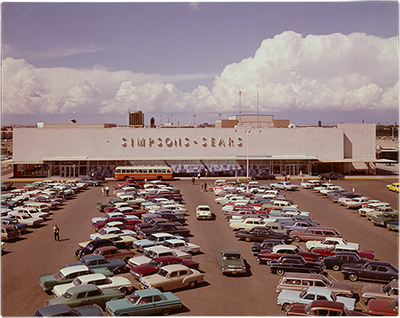
Archives of Manitoba, CH 0267 Government photographs, GR0201, GH-64-94 Winnipeg, Polo Park Shopping Centre, 1964, CV 164-1
Want to know more? Search Keystone for other records related to Polo Park, cars, and the ‘government photographer’ for other early photos of Winnipeg. You can also Visit Us in person at the Archives of Manitoba.
Want to participate in Your Archives? See Submit Your Story for details. You may e-mail us at [email protected] with a comment about this blog post and your comments may be included on this page.
February 18, 2020
1967 Pan Am Games documentary – Submission from Ross Munro, filmmaker, born in Winnipeg now living in Vancouver, B.C.
“Even though my wife and film producing partner Maria and I are located in Vancouver, our new documentary film ‘European Tour '73’ – which is based on my father's obsession with connecting his children to his own memories of when his father fought with the Canadian military in WW2 in Europe – required us to return to my hometown of Winnipeg for more essential research.
“Luckily, we ended up at the treasure trove of all things historical at the magnificent building that housed the Manitoba Archives which proved an invaluable help in grounding our film with certain essential details from the province's past. In our film we needed to reconstruct my grandfather's wartime experiences as he served and, subsequently, was wounded while fighting with the Winnipeg-based Queen's Own Cameron's Highlanders in France in WW2.
“Further to this, we needed to visually set the scene in showing how the city of Winnipeg looked circa 1973 – the year my parents took us on a trip to Europe that we subsequently moulded the story of my grandfather's wartime exploits around. Fortunately, the great staff at the Archives of Manitoba were able to find and allow us to view some amazing DVDs documenting Winnipeg and Manitoba circa the late 1960s/70s – including the richly rewarding documentary about Winnipeg's 1967 Pan Am Games! – all of which, when viewed, helped immensely by inspiring us to put together a more historically accurate documentary.”
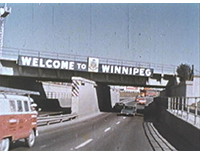
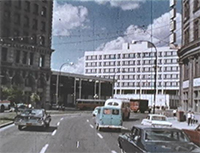
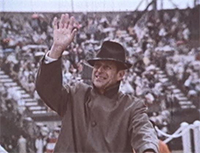
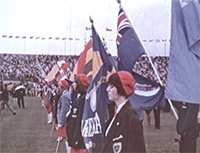
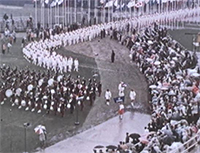
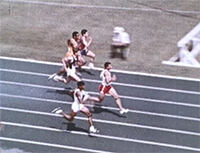
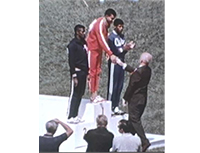
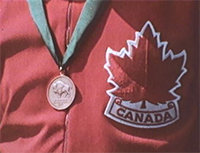
Archives of Manitoba, Pan-American Games (1967) Society fonds, Image from the film entitled "5th Pan-American Games," 1967, V223.
Want to know more? Search Keystone for other records related to Pan-American Games, Second World War, and Highlanders. You can also Visit Us in person at the Archives of Manitoba.
Want to participate in Your Archives? See Submit Your Story for details. You may e-mail us at [email protected] with a comment about this blog post and your comments may be included on this page.
February 14, 2020
HBC's 1919 film expedition: textual materials and nitrate film footage - Submission from Kevin Nikkel, filmmaker
“For each documentary project I work on, I inevitably find myself digging through the Keystone database looking for references. There is a strange compulsion that takes over as I work my way deeper into the online references. I'm led to a file folder, a stack of photos, or flip top box delivered to my table in the reading room. The clock chimes. The sound of a cart being wheeled from one end of the room to the other. Nothing in this box, but I remember that I've found gold in here before, so I keep digging.
“The greatest load of gold I found, that I will always treasure, are the materials dealing with the HBC's 1919 film expedition across Northern Canada to produce their silent feature film ‘The Romance of the Far Fur Country’. From the first description I found in Peter Geller's book ‘Northern Exposures’ I followed the trail of footnotes and endnotes to the Archives of Manitoba.
“The trail didn't end there--soon I was over to England to the British Film Institute's collection where the HBC's nitrate film had waited for decades to be re-discovered and returned to audiences in Canada. With the help of Keeper Maureen Dolyniuk, archivist James Gorton, academic Peter Geller, and my collaborator Chris Nikkel--the years spent working on this project were a delight, culminating in the release of my documentary ‘On the Trail of the Far Fur Country’ in 2014 and the re-release of HBC's ‘Romance of the Far Fur Country’ shortly after.
“The archival collection of materials dealing with this expedition grew along with the project during this time. The HBCA welcomed the nitrate materials back home to the vaults in Winnipeg. The Wyckoff family in California agreed to donate their grandfather's letters, journals and photographs dealing with the 1919 expedition to the HBCA as well [Arthur M. Irvine].
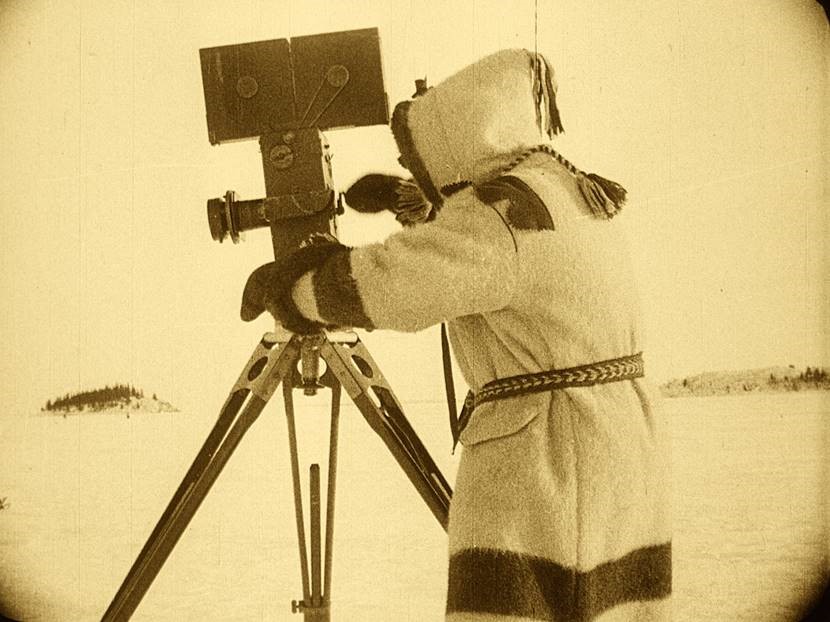
Hudson's Bay Company Archives, Archives of Manitoba, The trials and tribulations of a cameraman, HB2011/2, 1920, F120-1 - F 120-2
“As I reflect on these holdings in the Archives of Manitoba, I recognize how privileged I've been to collaborate with the archives as a storyteller. I certainly couldn't do what I do without the materials and collaborators we have here in the Hudson's Bay Company Archives and the Provincial Archives of Manitoba.”
Want to know more? Search Keystone for other records related to Romance of the Far Fur Country, HBC films, Arthur Irvine. Learn more about the Hudson Bay Company Archives. You can also Visit Us in person at the Archives of Manitoba.
February 7, 2020
Welcome and submission from Minister of Sport, Culture and Heritage Minister and the Minister Responsible for the Status of Women, Honourable Cathy Cox
“It is my pleasure to welcome everyone to Your Archives: The Histories We Share and provide the inaugural submission.
“I have chosen an election postcard distributed by Edith Rogers, the first woman elected to the Manitoba Legislative Assembly. Women won the right to vote in 1916, and the following election, in 1920, was the first since the change in legislation. Edith won her seat in the 1920 election and again in 1922 and 1927 before retiring from politics.


Archives of Manitoba, Edith Rogers fonds, Item 15, election postcard, 1922, P188A/1
“As Minister Responsible for the Status of Women, this postcard reminds me of the amazing contributions women have made to Manitoba through the course of our history. As the Minister of Sport, Culture and Heritage, I am grateful to the Archives and our dedicated staff who work to preserve this piece of history and so many more amazing records that tell our unique stories.”
Want to know more? Search Keystone for other records related to Edith Rogers, suffrage, and the Manitoba Legislative Assembly. Check out blog posts related to the 100th anniversary of women’s suffrage in Manitoba in the ‘At Home and Away’ online exhibit and a post dedicated to Edith Rogers. You can also Visit Us in person at the Archives of Manitoba.



